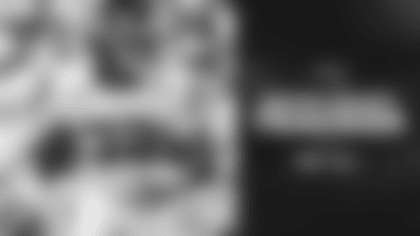[

]()
BB: There are no new updates on this end. No news on the injury report, we're status quo.
Q: You guys seem to be throwing the ball more than usual and so are many other teams in the league. Do you think that this is a trend that everyone is going to have to adjust to?
BB: That's a good question. I think that the best I could do is to speak to our situation. I really don't know if I've had time to look at any league-wide trends. Clearly one of our objectives in the off-season was to increase the production from our group of receivers including the tight end position. I think we've been able to do that and we've gotten production from them the first two weeks. We'll see whether or not that continues. League-wide, I've heard the same numbers that you have. I really haven't had the chance to study it so I'm not sure if there is a, like you said, just an aberration or whether that is really the start of a significant trend. Right now, it's just pretty much for me, team to team. I don't think I'm on top of the league trends maybe like people that see more games than I do.
Q: Wouldn't the warm weather play a factor in the passing game?
BB: There's no doubt. There's times in the northeast, and over in the north, where it's hard to throw whether there's a defense out there or not. It's hard to throw and it's hard to kick. There's no question that later in the year that the weather can affect what you're doing in terms of throwing or running the ball. But at this time of year it should be negligible.
Q: How is Leonard Myers coming along?
BB: Good. Talked to Leonard yesterday, I think he's coming along well, probably about on schedule. The earliest he could be back would be the sixth week, after the sixth game, and then he could begin practicing and could be activated for the seventh game. That would only be with short practice, but that's the earliest he could come back.
Q: That's not a drop-dead date right?
BB: No. There's actually a six-week window from the sixth week to the twelfth week where the player could be activated. By the 12th week he would either have to be activated or placed back on reserve and that would be injured reserve and he would be out for the year. The P.U.P. reserve (physically unable to perform) keeps an open window in there for the six to twelve week period.
Q: Can you talk about Tebucky Jones' development since he came here?
BB: Yeah, Tebucky is one of our hardest working players. He's a real hard worker in the off-season program on his physical conditioning. He's also a hard worker in terms of film-study and going over the game plans and really preparing for all the different situations that he's involved in both in the kicking game and on defense. I think that work is definitely paying off. He's a guy who gets a little bit better each week, gets a little bit better each year, continues to work hard and improve on the things that he knows he needs to work on. His strengths are still his strengths. It's really been a good steady improvement, it hasn't been a real spike here and a spike there, but he's been very consistent and has gotten professionally better over the last two years.
Q: Can you talk about Kenyatta Jones? Has he done everything you thought he would over the last two games?
BB: I think Kenyatta has done a credible job at right tackle in these first two games. You know it's a long year, a long haul and that tackle position has a lot of… you need a lot of staying power there. It's a position where one mental mistake and you turn a guy loose and strips out the quarterback or tip a ball, cause an interception stuff like that. It's a position where you can't afford mental breakdowns and you can't afford physical breakdowns like giving up the inside or being late off the ball or getting beat around the edge and things like that. I don't know if you can fully judge those guys until they've been in it for a long haul and you can see what you're going to get every week and it needs to be consistent at that position. I think that he's had a decent camp and has done certainly a respectable job the first two weeks against good competition.
Q: Did you think you were going to get what you did get from him last season?
BB: When we drafted him?
Q: Yes.
BB: Well, I don't know. Last year Kenyatta played more plays in preseason than any other player that we had. Way more than anybody on the offensive line. He got a lot of reps in training camp and in the preseason games. Right there in the end of the preseason was where we started to get a couple of our players back on the line last year like (Mike) Compton for one, (Matt) Light, the other guys missed time but Light and Compton both missed significant time in preseason and then came back right in the last preseason game for a few games and then Compton not until the opener against Cincinnati. Then Kenyatta got obviously less reps at that point. I think that he's shown from day one that he's physically capable of playing and just needs technique work, needs consistency. But he has the ability to play both on the left side and the right side because he's played those, not just for a quarter, he's had multiple games, regular season and preseason where he's played that spot. It's just 10 games now that he's played, including the last two pre-seasons significant playing time at either tackle position. He's got a lot of good plays to show out there. Then there are some other ones that could be a little better.
Q: Is he one of the strongest guys you have?
BB: Yeah, he's got real good upper body strength. Kenyatta is very strong.
Q: Have your views changed at all on the importance of a player's adaptability and work ethic? Do you weigh that more heavily?
BB: More heavily? I don't know… probably not. I would just say on the work ethic, if a guy doesn't work harder how are you going to get any better? If he doesn't take coaching, can't take constructive criticism, and then try to apply that whether it be on the field or off the field; then I don't see how a player can improve. Then he just keeps doing the same thing. Now if that's good enough, it may be good enough. But it's hard for me to see where it would ever get any better. It probably is going to get worse. That doing just enough to get by each week is really you know the start of a new week and the fact that there is no carry over in what, for us from week to week there should be carry over, the opponents from week to week there's no carryover so you're always starting all over on the opponents but you shouldn't be starting all over with the things that you're doing. Those things should progressively get better as the season goes on. When they don't and there isn't a good work ethic then it's hard for me to see how a player is going to improve. Now if he can come in and play well enough without doing those things, then you live with that performance. If it's not good enough, then I don't see what there is to make you think that it's going to be any better.
Q: Did it take time for you to learn that you can't coach work ethic?
BB: I'll tell you, I don't think it's work ethic. I think it's really desire. I think there are a lot of players that come into the National Football League that don't really know what it takes to play in this league and sometimes that's their responsibility and sometimes it isn't. I would say usually it isn't. Whatever they have gone through in the past has just been at a different level than this. Good, bad or indifferent, that's what it's been. Making the adjustment to the National Football League is a lot bigger adjustment than it is for some players than it is for others. When they take that step up. A lot of guys because they have that high level of desire will respond to the new challenges that they face that they haven't faced in the past just like you step up from high school to college or junior high to high school or j.v. to varsity or whatever it is. Then there are other guys that don't meet that level of competition and then they probably get looked at for a while until it becomes obvious that they're not going to respond to it or they're just not good enough. I think desire in a way is a little more important than work ethic. The worst kind of work ethic is the guy who just does it because he really thinks he has to do it. There's not really any self-motivation, there's not a drive to do it. It's just 'I have to do it because I'm supposed to do it and I'll be glad when this is over and then I don't have to do it for another day or few hours or a week or whatever but I'm going to have to do it again'. Again it's really hard for a player to improve when he takes that kind of approach, not saying he's not doing the work, not he's putting in time, he's marking off the days, he's punching the clock but he's probably really not getting any better taking that approach to it. There's a fine line there, I think we kind of know what we're talking about, but it's not that easy sometimes to identify one from the other. But I've had a lot of players in my career come into the league who I didn't think were very hard workers and I questioned their overall competitiveness, but through time they proved that they did have the desire to do it and they would compete, they just didn't know how. Once they figured it out, what they really had to do, then that took them to a higher level that just wasn't evident when they started.
Q: Examples?
BB: I'd rather not say.
Q: Can you talk about Adam's (Vinatieri) production?
BB: Adam's had a good camp. I thought he kicked well in the preseason. He's done a good job with his opportunities so far. We've got a lot of confidence in him in any situation. If it comes to him having to make the play at a crucial time in the game, there's a lot of confidence from me and from this team that he'll make it.
Q: Can you talk about your early defensive success?
BB: I think whatever success we've had on defense is basically a result of good execution by the players and a lot of that comes from good preparation by the coaches and the players.
Q: But do you think as they become more comfortable with the system it just becomes more automatic for the players?
BB: Sure. Especially on defense. On defense, all 11 guys have to know what each other is doing. I'm not saying that Ty Law needs to know what Richard Seymour is doing exactly, but it all has to be tied together. Certainly the secondary has to be tied in with the linebackers. The linebackers have to be tied in with the secondary and the defensive line. They have to be tied in with each other within their unit. The offense is a little bit more segmented than that. To be good on defense everybody really has to know how to handle a lot of different situations and then they all have to function in unison. The more experience that you get in a system and the quicker that the players can not only react to what happens, but in a lot of cases, anticipate what's going to happen so that before it even happens they can alert each other to 'ok let's combo this, let's go in and out on these two receivers, you can see it coming' or things like that. It takes the last second reaction out the play as well but suddenly right at the end it's 'oh ok combo it' and then even though you got the right call on it, it's too late and you still get beat.
Q: Where is the balance between exposure and success with assistant coaches of successful teams?
BB: Well I think it starts with success. But I think in terms of exposure, the people you need to talk to are the ones that are doing the hiring and that varies from organization to organization. Sometimes the general managers do it. Sometimes the owners do it. Sometimes it's a combination of both. Each club has it's own set up and really they're probably all unique in their own way. A lot of times that has to do with what has preceded the situation. I think in this league, the way things are now; it's hard for me to believe that any general manager in the league doesn't know who all the coordinators are on virtually on every team. That would be like a general manager not knowing who the starting middle linebacker is. The general manager also probably knows who the key decision makers are in every organization. Whether that's the director of personnel, however the titles unfold within an organization, I think that those people know who the other ones are in the other organizations. Just like our defensive coordinator knows who the other teams receivers are and who their key players are and who their key coaches are, who their decision makers are on the opposite side of the ball. I think that's all pretty well known and pretty well established in the league regardless of whether a guy's name gets called out on TV or not I think that most people know. I can't speak for the non-football people, the people who aren't in the football part of it every single day. I'm sure that there is a wide variation in how well informed they are about the overall personnel in the league. I'm sure some of them are better informed than others.
Q: Did you ever feel like a lack of exposure hurt your chances?
BB: No. In my particular case I was totally driven by success and that's all I've ever really thought about. Exposure was never the number one thing for me. It was probably the number four thing for me.
Q: Did you have Bill Belichick flags on the sideline?
BB: Right. Banners hanging over the side of the stadium, Belichick's bunch and all of that, Belichick's brigade, no we didn't have any of those.







































